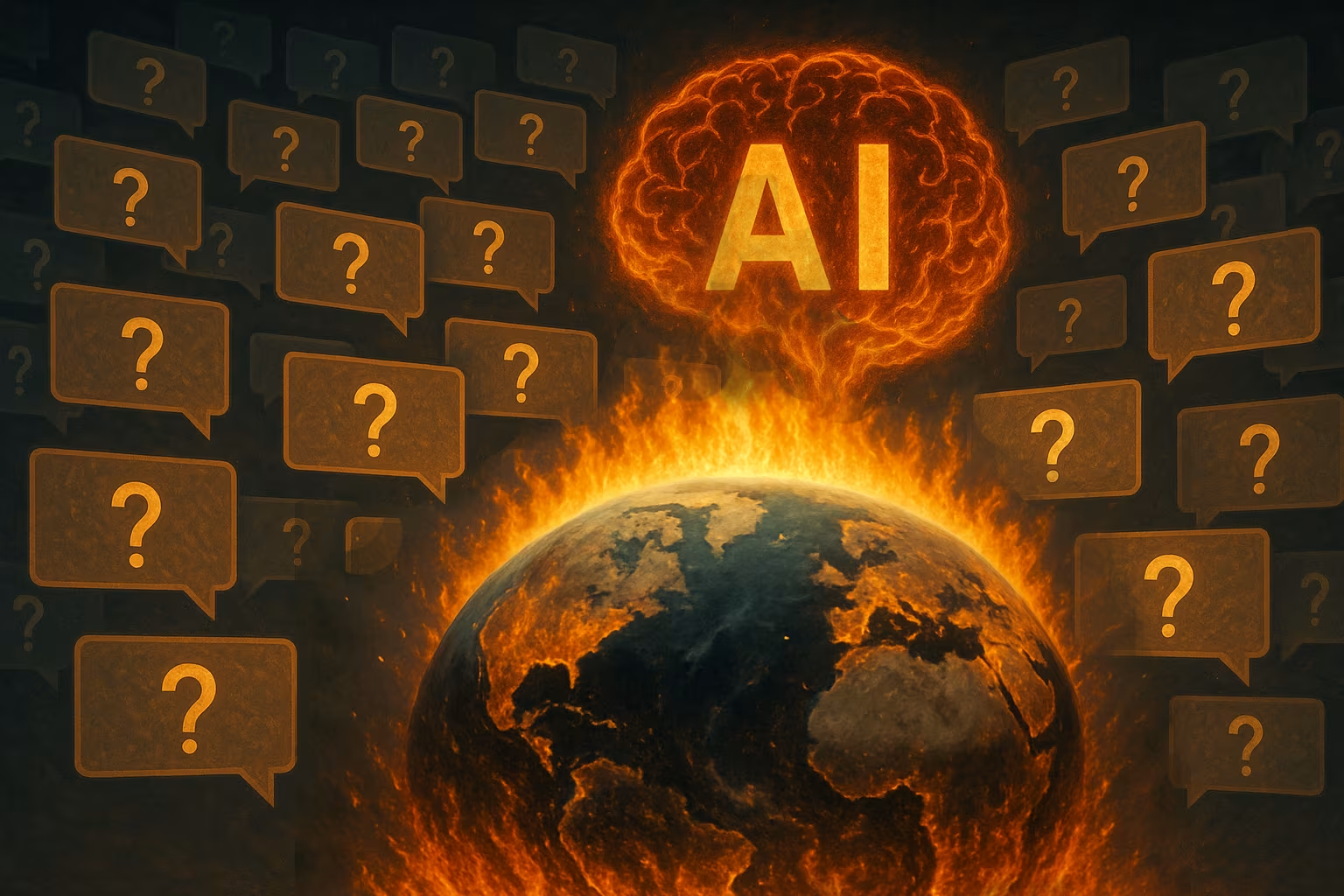AI Is Brilliant. But Is It Burning the Planet?
The Unseen Impact of AI
Right, let’s talk about AI for a minute. It’s absolutely everywhere at the moment, isn’t it? I’ll be honest — I’m as guilty as anyone of getting a bit giddy about it all. Need a proposal written? Boom, done in seconds. Twenty social media posts for next week? Easy peasy. Got a random question at 2am about why cats purr? AI’s got your back faster than you can say “Google it.”
But here’s what’s been keeping me up at night lately (apart from those 2am cat questions) — what’s the actual environmental impact of all this AI led digital wizardry we’re having so much fun with?
The Bit We Don’t See
Here’s the thing that’s easy to forget: AI might feel like magic floating about in the cloud, but behind every “Can you write this email for me?” is a proper power-hungry data centre somewhere, probably humming away like a small city. These servers aren’t just having a little think — they’re properly grafting, crunching through complex algorithms and burning through electricity like there’s no tomorrow.
Get this — studies reckon that a single AI prompt can gobble up 10 to 100 times more energy than your average Google search. That’s a lot! So every time I’m chatting away to ChatGPT or getting it to knock up a clever headline (guilty as charged), I’m basically using the energy equivalent of doing 50-odd Google searches.
The real impact of AI suddenly feels a bit less sparkly and sustainable, doesn’t it?
Why This Matters (To Me, Anyway)
Here at Marzipan, we bang on about sustainable web design quite a lot. We’re passionate about it – It’s what we do, after all.
We help brands build websites that are lighter, nippier, and generally less wasteful — because we know the internet isn’t some weightless wonderland. Every megabyte that gets shuffled about, every pointless bit of code, every website that takes an age to load… it all adds up to proper, real-world emissions. Heavy websites weigh heavy on our minds (and your Google ranking), so it’s a win for you and the planet.
There I was, feeling proud of our green efforts. We were starting a campaign to help more businesses learn about Sustainable Web Design. But at the same time, I was asking AI to help me superimpose pictures of whales into my holiday snaps (long story). Talk about mixed messages. One minute I’m signing up for 1% for the planet, while simultaneously setting it on fire, creating images of my cat dressed as a spaceman… (Different story)
But I promise there can be another side to all this. There’s a positive impact of AI too. It can genuinely save buckets of time and brainpower. It helps us work smarter, cuts through the boring repetitive stuff, and often gets us better results faster. That’s got to count for something in the grand scheme of things, hasn’t it? There’s a reason we’re all using after all.
The trick, we belive, is using it like you mean it. Not just because you can, but because you should. We want to start applying our mindfulness practice to ChatGTP so we can ensure the impact of AI is a purposeful one.
The Light at the End of the Tunnel
Before we all spiral into eco-anxiety, here’s some good news. The tech bods, and wider society, are actually taking this seriously now. Some people suggest millennials are steering clear so concerned are they for the negative impact of AI not just on the planet but their own mental health. In certain, more aware pockets of the internet, we’re starting to see:
Smaller, smarter AI models that don’t need to flex quite so hard for everyday tasks. Think of them as the energy-efficient lightbulbs of the AI world.
On-device AI that runs on your phone or laptop without phoning home to some massive server farm. Clever stuff.
Data centres powered by renewable energy — which is brilliant, assuming they’re not just slapping solar panels on for show.
Proper regulatory disccussions to stop companies from making vague claims about being “carbon neutral” whilst their servers are burning through coal-powered electricity.
AI isn’t going anywhere (nor should it, really), but we absolutely need to hold it to the same standards as everything else. It should work smarter, not harder.
What We’re Actually Going to Do About It
Here’s what I’m committing Marzipan to – in writing, in public, so we can be held accountable:
Using AI with purpose, not just because I’m feeling lazy. Do I really need it to write a two-line email? Probably not.
Picking the most efficient tools when I can be bothered to do the research (which, let’s be honest, isn’t always).
Offsetting my digital footprint where possible. I’m literally planting a tree tomorrow — partly for the planet, partly because I quite fancy getting my hands dirty.
Helping businesses like yours build better digital content so you can shine brighter online without needing half the internet to load it properly. That’s something we can actually control. We believe Doing Good Deserves to Be Seen. So we’re on a mission to help purpose-driven brands rise above the noise—without costing the earth. Our affordable AI Services use AI to bring about efficiencies and learnings that would otherwise take months to gain.
Over to You, Then
Have you given any thought to what your digital life is actually costing the planet? I’m not trying to guilt-trip anyone here — we’re all just figuring this out as we go along. But I’d love to know what you think?
Drop me a line if you fancy a chat about it. Because the first step to doing better is admitting we might need to do better in the first place, isn’t it?







